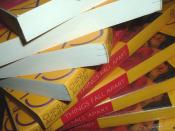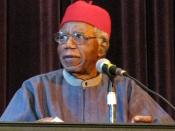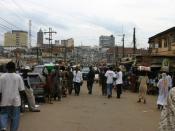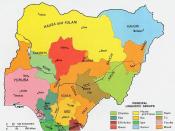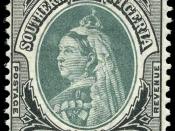Being set in the 60s, Chinua Achebe's book A Man of The People, introduces the reader to the social and political upheaval that was prevalent in the newly liberated African countries. Achebe skillfully weaves underlying themes like nationalism, empirism, corruption and the effects of western influence into the story. The quality of Achebe's writing is also seen in the way he presents one or a combination of these themes in his characters. Chinua Achebe's book is of great historical significance as it portrays the growing pains of each newly liberated country. It is also important as it aptly describes the situation in Nigeria prior to the national coup of 1966.
To further appreciate his book, a closer look at the main themes would be essential. Empirism was introduced to the reader initially through a mention of the political situation. The existing chaos was a result of the British political system in Nigeria, which excluded Africans.
Once African politicians came to power and wealth they lost all reason and logic and were out to make money only for themselves. A classic example would be Nanga. He was having apartments built with money that was not his own, to rent out to other residents. Empirism was clearly evident in the fact that the British were supporting the corrupt government since that was advantageous to their trade relations with Nigeria. The political upheaval that Nigeria was experiencing was a direct result of the British empire and its domination until their liberation.
One of the consequences of empirism was the very complacent attitude of the local people. When Josiah tried to steel a stick from the blind man, the local people all came together till they drove him out of their city. However the same people were aware of the corruption that existed among the politicians yet they insisted on ignoring and justify it by the fact that the politician was not white and that he was providing their need! Achebe introduces the reader to the idea of nationalism through Nanga. He is a man of the people as he is a local member of their community, he has been educated in Africa and more than that, he was out to help the members of his community by providing them with water pipes. Although Nanga was fleecing them, the people were willing to bear it quietly rather than take action against him as he was from their community. Nanga's character is a nationalist and brings out the nationalism in the people.
Nationalism is also portrayed in Odili and Max. Both of them were members of the educated elite who wanted to channel their education towards making a difference in the social and political states before it got too late. They wanted to use their political party to represent the upper echelon of society and the poor man fairly. However the illiterate people had no regard for the educated. The main cause for the disregard of the educated people was the fact that their education had been European education. It went against the grain of nationalism. This was another reason for the peoples' support of Nanga as opposed to Odili in the elections. Nationalism was in truth one of the driving factors to the liberation of Nigeria.
Western influence and modernization are two underlying themes in Achebe's book that do warrant a mention. Odili is a good example of western influence. He has had western exposure through his education and has high aspirations of going abroad for his higher studies. Western influence is responsible for modernization and is seen among the people who want proper toilets and water pipes to make their life easier and better. Other modern characters in the book include, Max, Eunice and Odili's father. They are modern in their thinking and their approach to life. Unlike the older generation, Odili's father was unwilling to go back on his word and was willing to still by it whatever the consequences were. Max and Eunice are modern in their thinking, dressing and their rational approach to politics.
A final theme that is prevalent through out Achebe's book is corruption. It has penetrated every sphere of existence. Corruption is seen in Nanga, Chief Koko, Chief Koko's wife, politics, military and so on. Nanga and Koko stole from the people. They had no ethics and as long as they were getting what they wanted they did not care about anyone. Chief Koko's wife is corrupt too as she lead the Women's Wing of the POP to stuff the ballot boxes with ballots in favor of her husband's party. The deep-rooted corruption of the day was a leading factor for the failure of the state and the eventual overthrow of the government in the national coup of 1966.
Chinua Achebe has done a great job in presenting the reader with a realistic view of the situation in Nigeria prior to the coup. The book incorporates all of the above-mentioned themes in perfect harmony. Achebe also incorporates pidgin English to introduce the reader to the local language and to see the humor in their style of speech. In conclusion, A Man of The People is definitely a book worth reading for both its historical significance and its readability.
